Items
Subject is exactly
Health & Wellness
-
2024-07-23
Why don't I remember most of Covid?
I remember working remotely from my kitchen for my job. I remember watching movies. I remember being locked down and taking trips to the supermarket wearing masks. I remember avoiding touching things and copious amounts of hand sanitizer. I remember my parents getting older and using facetime to be able to see them. I remember them dying and not being able to take a flight across the country to be there. I remember that birthdays happened without parties. I remember having Covid after being vaccinated, being careful and giving up so much of life. I remember finding out that friends had passed away and not knowing they passed. I remember starting to make changes in the way I do things like open a door without touching the handle. I remember being concerned for the safety of others and wearing a mask for their protection. I remember being chastised for wearing a mask and people trying to shame me for it. I remember holding my breath when a person passed me on the street to reduce risk. I remember standing farther away from people in line and not talking to people. I remember not seeing a smile and not remembering to smile. I smile now. It takes effort but I smile now. -
 2024-05-20
2024-05-20Walk With Me Surving Covid
This book takes you on Tracys journey as a COVID survivor through a traumatic experience. She is faced with losing her independence, having to rely on others, and letting go of a love she thought she wanted only to find the real love she needed. Tracy shares how she copes with depression and PTSD and lives and functions with it daily. This book is a powerful testimonial from a truly strong woman who shares how her faith was her strength -
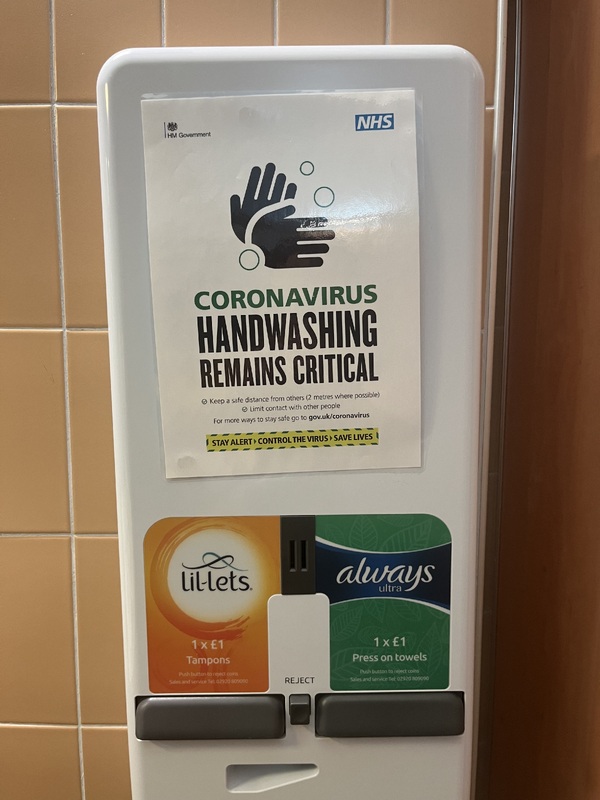 2024-06-18
2024-06-18Handwashing @ the National Records of Scotland
It is summer 2024, I am visiting Edinburgh, Scotland for a study abroad class with ASU online MA history students. Today, I am working at the National Records of Scotland. As I visited the loo before I headed upstairs to research, I noticed this sign reminding staff and the public to continue washing their hands to reduce the spread of COVID-19. I hope that none of our students/staff get COVID while here and that it is a mild strain if they do. It feels like a phantom on the past, but one that could certainly reappear unexpectedly. -
2024-05-09
COVID 19 zero contact
The pandemic was the worst for me to be honest because I couldn't take a class that was designed for on campus. Because of that, I had to drop the class and wait for campus classes to be available so I could learn better in the classroom settings. I was depressed because it was my first time dropping a class since I started college in spring 2018. I had to wait for the next semester to retake the class which held me back a semester . I'm happy I got out of that stage which took me a while to get out of. I had to go to work regardless of what was happening in the pandemic because I was working in a retail store at the time and wasn't allowed to stay home like other people. Until you have COVID and you submit your doctor's note to get two weeks off. The new rules that were made for the retail stores cause people to fight because of a cough or a sneeze was just overall depressing. The news was very depressing because older people in the nursing home could see their loved ones before they die or hug them for the last time. Nurses couldn't go home to their family because they had to work long hours and they did not want to carry any disease home to their loved ones. 2020 was No bonding time at this moment. -
2024-05-07
Life Before and After COVID-19
Before COVID-19, no one thought twice about social interactions. After COVD-19 that's all people were thinking about. Something that was so normal and mindless became the one thing that people were afraid of. After lockdown was over, many people had social anxiety because they went form not seeing anyone to seeing everyone. People were so afraid of catching COVID-19 that they chose to be alone rather than live their life and make memories. Coming back to school after lockdown was so scary. I was so used to not having to see anyone or care about what anyone thinks because we had class from home. Seeing all these people, made me so self conscious of what people think and how to behave normally. It was almost as if I had never talked to people in my life. Even now in 2024, people don't interact in the same as before. It's more normal than ever to see people wearing masks. I feel that this is the new normal and we are probably never going back to how it was before COVID-19. -
2020-04-04
Covid Helped Me Grow
My story takes place at the beginning of the pandemic in 2020 (Quarantine). The two weeks off that my high school mentioned had passed. It was at that point that I knew it was going to be a lot longer than two weeks. I was always quite the introvert, so the first week or so was very manageable for me. However, I soon realized how much I underappreciated getting the chance to leave the house and go do things such as going to restaurants, running errands, and most importantly, spending quality time with friends. It was during this time period that I was at one of the lowest mental states of my life. To add on to that, I was in a relationship at the time of quarantine. Long story short, we had some complications with our relationship before the pandemic, and it only got worse during the early days of it. However, for a more positive note, I spent a lot of time with my family and also my friends via facetime. Aside from that, I had an incredible amount of time to myself while stuck in quarantine. I used this time to myself to reflect on myself and how to improve my life and to get it together. As some time passed and after a lot of journaling, I had made some decisions that was going to change my life and make me a better and stronger individual. To list off a few, I had decided to end my relationship with this girl because I had found that we truly were not compatible with each other. Another thing was to get my first job so I can make money, stay productive, and also meet new people. I also decided that i was gonna be more social and really try my best to put myself out of my comfort zone moving forward, once the quarantine had concluded. I can proudly say that while I'm not perfect by any means, I had made these changes in my life and I am now extremely content with myself. Overall, this story is important to me because while I was in one of the worst periods of my life, this was one of, if not, the biggest learning period of my entire life. The amount of lessons that I took from my experience and the adversity that I went through during the pandemic has shaped me up to becoming the best version of myself. I can confidently say that I am just getting started and will continue to constantly improve myself as time will go on. -
2020-12-20
Declaring Patient 100 Deceased Life as a NYC EMT During an Unprecedented Global Pandemic
December 20th, 2020, started as an “ordinary” day for myself and my colleagues. 1600 hours rolled around, and my partner and I clocked in for our sixteen-hour tour. We had finally adjusted to our new routine of working a mandatory sixteen hours as opposed to twelve. As emergency medical technicians, we were at the forefront of the COVID-19 Pandemic in New York City. Our region was hit hard by COVID-19 and seemed to be the epicenter of the pandemic for longer than one could ever imagine. For NYC EMS workers before the pandemic, it was common to see around three thousand calls for service daily across all five boroughs. Once the pandemic struck the call volume rapidly overwhelmed the city's EMS resources as they answered a record seven thousand calls for service daily. My partner and I made small talk as we awaited the arrival of the outgoing crew. The day shift arrived back at the station exhausted, defeated, and depressed. They informed us that during their sixteen-hour tour, they had answered twenty calls for service; fifteen of which were for critically ill patients. After some small talk, we exchanged medication kits and radios as it was our turn to serve the great city. Immediately after logging on to the computer system and giving the dispatch center an in-service signal, we were called for a priority one assignment. Our unit was called to the scene of a thirty-two-year-old mother diagnosed with COVID-19 who had stopped breathing. As we arrived at the scene, I donned my four-day-old n95 mask, as well as a makeshift gown made from a garbage bag with holes cut for my head and arms. As we made our way up the five flights of stairs the sound of the screams grew louder. We entered the apartment to find a woman lying on the couch who was clinically deceased. For the next forty-five minutes, my partner and I worked feverishly to perform cardiopulmonary resuscitation, defibrillation, endotracheal intubation, as well as intravenous cardiac drug administration. Despite our efforts, the patient continued to show no signs of life, my partner and I locked eyes and nodded at one another, knowing we had done all that we possibly could have for this patient. I switched the cardiac monitor off and looked down at my watch as I said, “Time of death 1705 hours”. Our next responsibility was to inform the patient’s husband and children of her passing. While you train for many hours to show empathy after death, this task never gets easier. My partner sat in the kitchen with the family, while I prepared the paperwork for a death pronouncement. My partner delivered the life-shattering news and did her best to console a grieving family. After returning to our ambulance to decontaminate our equipment and restock for the next assignment I opened my logbook to record the death encounter. My heart sank as I turned to the next open page which was page number one hundred. In less than one year, I had pronounced one hundred patients deceased from COVID-related illnesses. In my short career before the pandemic, I had only pronounced about fifteen patients deceased. It was at that moment that the true magnitude of the pandemic sank in. COVID-19 had decimated the way of New York City life, the previously bustling city remained shuttered as many remained in indoors in hopes of preventing illness. Before the pandemic, I had known the city as a connection of vibrant neighborhoods filled with culture and joy. COVID-19 had robbed our great city of its life and color; for the next two years, the city appeared black and white as a shell of its previous greatness. These thoughts quickly fled my mind as my unit was once again called to another high-priority assignment. We were called to a sixteen-year-old man diagnosed with asthma, who had recently contracted COVID-19 and was struggling to breathe. Our days were filled with assignments like these, often with no rest, and zero opportunities for a meal break. Nearly one year into the COVID-19 pandemic, my colleagues and I were exhausted, and our mental health and morale were at an all-time low. Many of my collogues fell ill, and four of them died because of COVID-19. We had often asked ourselves and one another; “Why Us? Why are we still doing this job? and when will this end?” While these times were challenging, we understood that we had been called to work in EMS because of our passion for caring for those in need. Day in and day out, we found strength and resilience in one another. My colleagues and I had implemented daily peer support groups in which all were welcome to come and speak about their experiences. While COVID-19 seemed to pull the world apart, it pulled EMS staff closer together. Enemies quickly became friends, and seemingly overnight we all became family. Our perspectives were unique as we were the only healthcare providers to enter the homes of the ill, and feverishly worked to care for them under less-than-ideal conditions. As the number of COVID-19 cases began to decline with the introduction of the vaccine, my colleagues and I felt we could breathe a sigh of relief. As quickly as the pandemic entered our great city, it seemed to vanish even faster. Each shift brought hope as we watched businesses reopen, and the streets were once again filled with color and culture. While we experienced new variants and spikes in COVID-19 cases, we felt that our great city had become stronger and more resilient. While COVID has changed our way of life, one thing I will never forget is the comradery we built amongst the emergency medical services personnel. To this day my colleagues remain a second family in which I can confide after a difficult shift. While COVID was one of the greatest challenges faced by New York City, I feel that it has made us stronger and more resilient than ever. -
2021-04-19
Brave
Covid 19 almost took away one of the most significant people in my life, my grandmother. The near loss of my grandmother due to COVID-19 made me realize the devastating impact infectious diseases can have on individuals and their families. It reinforced the importance of proactive measures to prevent disease spread and protect vulnerable populations, regardless of ethnicity or background. This experience made me strong enough and brave enough to provide my grandmother with the support and comfort needed during this scariest moment of my life. During my grandmother's battle with COVID-19, I learned firsthand how crucial it is to provide unwavering support and comfort to loved ones during challenging times. The emotional strength and presence I offered her made a significant difference in her recovery journey, reminding me of the power of love and compassion in the face of adversity. -
2024-04-18
The Dream
The Dream that kept me going despite repeated severe Sickness, All I want to say is that the longer the darkness, the longer will be the light. -
2020-03-14
Leah's experience with Covid
The objective of this story is my personal experience with Covid 19 and the shutting down of the world around us due to the health affects. At the beginning of the Covid 19 in 2020 where all schools were beginning to mandate the wearing of surgical masks to stop the spreading of the newly found disease, Personally I didn't expect this disease would shut down what we once knew as normal. In the early days of the pandemic my family was the ones who were reluctant to wear the masks, as we did not realize the danger that is to come. Only a few weeks had gone by and the schools and stores were beginning to shut down and everyone had begun to learn the severity of this pandemic. Doctors were turning away patients who were suffering with health issues caused by outside sources other than the pandemic, causing other lives to decline. As a middle school student watching the depletion of the world right before my eyes, I was afraid of what may come in the following years. I was afraid of the pandemic and what negative affects that it may bring to me and my older family members. I was also afraid of the new norm that I now had to get used to along with the remote learning and not being to hangout with my friends and family as I once did. -
0012-03-20
The Day the World Changed
On March 12th, 2020, I found out the fate of the remainder of my first spring semester as a college student. I don’t remember much about days during quarantine, but I do remember specific details of this day. It was the week before Spring Break for UAB, and all students were preparing for a week off from school. That weekend, my family was planning a trip to New Orleans for the weekend as my mother’s employer offered her a free two-night stay at any hotel of her choosing. My dad and I were planning to finally visit the National World War Two Museum. As my friend and I were walking to dinner at a local poke place in Five Points South, I received my first email that my English class would remain virtual for the remainder of the semester. My professor had Type 1 Diabetes and did not want to risk his health. Shortly after, the entire student body of UAB received an email that students would not return to campus until April 1st, 2020, at the earliest. While some students decided to pack up all of their belongings and take them home with them, others truly believed we would be coming back on April 1st. I decided not to take my belongings with me and traveled four hours to my hometown for the extended break. I went home that Friday, March 13th, 2020, after taking my midterm for Biological Anthropology. Once I arrived home, my parents made the decision to cancel our trip as the spread of COVID-19 was unknown at this time, and they did not want to risk going to a public and crowded place like New Orleans. Instead, my father and I traveled four hours back to Birmingham to pack up my dorm room and bring my belongings home. At this time UAB had completely shut down and was limiting access to campus and the dorms. They only allowed me 15 minutes to get any belongings needed. After that trip, UAB officially closed for the remainder of the term and students belongings were moved out of the dorms by moving companies to make room for healthcare workers. We did not get the chance to go on our New Orleans trip until over two years later, in 2022. I planned a big trip for my 21st birthday with my friends and family. While most restrictions have been lifted, people were still wearing masks, and businesses were still enforcing the three- to six-foot social distancing. I wasn’t surprised, as just earlier in the year, my employer required face masks for the spike in COVID cases in Birmingham. I remember going to restaurants and we were required to wait outside for our table. In the National World War Two museum, there were stickers on the floor that represented how far we should stand from each other. While many of the restrictions, including the social distancing and wearing a mask, had been lifted, it was nice to see that people were still making it a point to follow them for the safety of themselves and others. -
2021-06-14
Family Trip to Florida 2021
My father is a world class powerlifter who has podium placed at world championships before. He was planning to do the qualifier for the next world championship in 2020, but that was understandably delayed. When stay at home orders were lifted, he competed in the state level qualification event, in his case North Carolina, for the national championship. He had to lift in a mask, which was uncomfortable and potentially dangerous as lifters could not always get enough oxygen during and after a lift causing some to pass out and need medical attention. He did well enough in the qualifier to proceed to the national championship in Daytona Beach, Florida. On that trip, COVID restrictions were very few, if any, with the hotel, lifting event, and restaurants/stores not having mask mandates or vaccination checkpoints. Unfortunately, my dad did not win this championship. He did, however, come back the next year and won the 2022 championship in Orlando, Florida. When we went on that trip, COVID precautions were not really present at all, and it almost seemed life it was before COVID. -
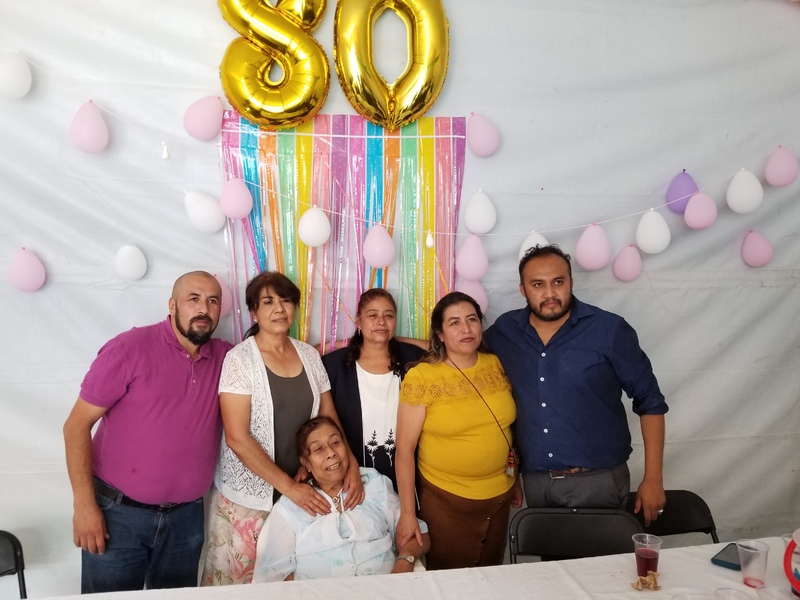 2021-07-30
2021-07-30Covid Was Over
In 2021 my Mom and I planned a trip to Mexico to visit her side of the Family. We had been putting off the trip because of a lack of money and then Covid hit. It had been seven years since my mom had been able to visit her mother and her siblings. At this point in time, travel restrictions and quarantines were largely a thing of the past. People in my area no longer considered Covid to be a threat in the way it was viewed in the early part of 2020. Masks weren’t in common use and people went about as they pleased. Deaths were still rising. By June of 2021 our trip took place. Most of the big travel restrictions had been lifted, but oddly enough America still had testing restrictions for reentry. Mexico, a nation that still cared about limiting the spread of the virus, had no testing or vaccination requirements for entry. We went on our trip and had a great time visiting our family in Mexico City. While staying we decided to visit the Museum of Anthropology in the city center. To enter, we had to go one at a time and be sprayed with some sort of sanitization chemicals by guards in the front. Being a poor Spanish speaker I was afraid I would do something wrong and that they wouldn’t let me enter. Thankfully everything went well at that time. When the time came to leave we had to locate a pharmacy that would do rapid testing for our return trip. America had very specific instructions that only allowed for certain pharmacies to do the testing. This made it very difficult to find one that would work. When we got to the testing site it reminded me of zombie movies. The pharmacy was surrounded by tall iron fences with razor wire at the top. People wanting to be tested were funneled one by one to a testing kiosk. The kiosk itself was a glass paneled box complete with attached glove arms and a ventilation system. The test itself was a simple swab test that was much more painful than I thought it would be. My nose hurt for an hour afterward. On the day of our departure I was nervous that something would not be correct with our records and we would be stopped from leaving Mexico. The person who officially went over our records was in the baggage check in area. She took our documents and didn’t even look at them for one second before handing them back. I was confused but this, since our American travel sites made such a big deal about it. Honestly, we could have easily faked the records to get back into America. Ultimately we got home safe and sound. A little over a month later everything went to hell. My cousin, Aunt, and Abuelita all contracted Covid and were hospitalized. My Aunt and Abuelita passed away from the virus, only my cousin survived. My mom had to deal with the loss of two close family members less than two weeks apart. It felt so wrong, how could they have both died when Covid was over? -
2020-12-30
Travelling in December 2020 and January 2021
I remember first hearing about COVID-19 in January of 2020. There were concerning reports that Chinese authorities were wielding apartment doors shut to contain the virus, which was certainly a bad sign, and I was fairly certain that if those measures were being taken, the disease was a big deal. I followed the developments fairly closely from my parents' home in Oklahoma. In late March, around the time of my 21st birthday, I was working as a substitute teacher at the high school I graduated from. I was able to work one singular day before the virus shut down the school district. The next few months were full of changes. Uniformed National Guard personnel staffed vaccination centers, groceries were delivered directly to houses, and entire industries went work-from-home. By the time December rolled around, the initial panic had mostly died down, and many travel restrictions were lifted. I needed a break. I decided to catch a ride with a buddy of mine from Indiana who just so happened to have family here in Tulsa. I bought a plane ticket to facilitate my return trip. We have some mutual friends in Zionsville, a little suburb of Indianapolis, and we collectively decided that we wanted to have a New Years party. Here in suburban Oklahoma, many of the mask mandates had been dropped by this point, but it was still prudent to carry a mask in the somewhat rare event that a business owner preferred patrons cover their faces. It was much the same in Zionsville, but businesses in Indianapolis proper, in my experience, were much more strict. I understood that COVID-19 was a serious health risk, and that it was smart to wear a mask, but it was somewhat confusing to go from a place that seemed so carefree - and admittedly irresponsible - to a place that was still mandating face coverings. The party with my friends went well and many margaritas were consumed. It was a much-needed break. The locations with the strongest COVID restrictions were perhaps the airports. It made sense to me, since airline travel likely contributed a great deal to the initial spread of the disease. Regardless of reasonability, masks were worn the entire duration of the flight. The entire cabin smelled of sanitation wipes, and the airport felt somewhat emptier than I was used to. This was Indianapolis' airport. I had a layover in Dallas and that Airport felt much more lively, in that sort of carefree way I was accustomed to back in Oklahoma. Masks were still required on the plane itself. I landed back home late in the evening without too much excitement. It was nice to take my mask off when I got into my mom's car. Overall, the trip made me realize that different states and regions were treating the ongoing pandemic very differently. While New Years was a welcome break from the monotony of the initial quarantine year, the trip did raise questions about my state government's commitment to public health and safety. -
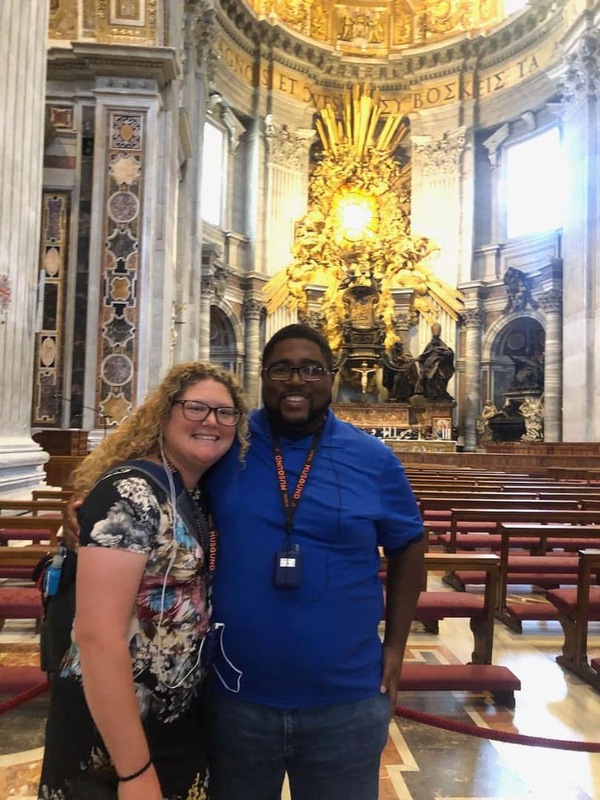 2022-07-09
2022-07-09A New World: How Covid-19 affected my anniversary trip.
Originally, I always had the idea of taking my wife on a Mediterranean cruise for our 10 year wedding anniversary. However, it seemed as if Covid-19 would make those plans impossible to carry out. Thankfully, vaccines became available, and the Mediterranean countries would begin to open up to tourism again with some restrictions. On July 2022, we flew out to Rome, Italy to spend a few days there before the cruise itself. Even going through the airport was an entirely different experience, since this was our first time seriously dealing with the restricted rules(we had previously isolated ourselves for over a year and did everything online). We had to wear masks everywhere in the airport, our tram was partitioned into sections by barriers, and airplane boarding took longer since the boarding groups were made significantly smaller. When we arrived in Rome, we still had to wear masks inside of buildings(which was consistent with our experience all throughout Europe) and transportation(some buses enforced it, some didn't). In addition, as we visited restaurants, shops, and tourist locations, there were only a limited amount of people allowed in each location since there was a priority in having space between different groups. The restrictions continued as we embarked on our cruise a few days after. If you were vaccinated(as we were), you only had to take one antigen rapid test before you entered the ship to make sure that you did not have Covid-19. If you were not vaccinated, you had to take two tests, one a few days before you entered the ship, and one on the day of embarkation. This was unique, as a lot of other cruise brands were not letting anyone who was unvaccinated aboard their ships. When we boarded the boat, each group was given their own table and their own serving team(with masks on). This was possible because the allowed capacity that was on the boat was severely reduced. This allowed for us to have a more intimate experience with the serving staff, which was still at a relatively high capacity as compared to the population of the customers. As it comes to the picture itself, it is very important because we were only allowed to take off our masks for pictures inside of buildings. In addition, that picture was inside of St. Peter's Basilica in the Vatican, which is a place that I have always wanted to enter due to its Christian symbolism. The walls and the statues tell the story of Christianity that has spanned over thousands of years. -
2021-03-11
Missouri Travels A Year After COVID
In 2020, the COVID-19 pandemic shut everything down, and the world went into a global lock down. A year later, restrictions started being lifted and my mother and I traveled to Osage Beach Missouri, as well as the surrounding areas. Because Osage Beach was a tourist town on a lake most of the local attractions were closed due to it being the off season. It was March of 2021. Previously, my family had loved going to Missouri, but always had gone to Branson. We chose Osage Beach, however, because we could get free accommodations through my parents timeshare points. The day I remember most of the trip was traveling to St. Louis, Missouri to visit the St. Louis Zoo. The day before going we had to book a time slot in order to reduce our chances of being exposed to COVID and in order for the zoo to know approximately how many people were there. We did not have to wear medical masks outdoors, since we were fully vaccinated, but when in areas like the gift shop or some dining facilities we had to wear masks. If a zoo worker asked to see our COVID vaccine cards we had to show them or put on masks. After visiting the zoo, my mom and I went to a local pizza pub in Osage Beach that had St. Louis style pizzas. They were not as concerned about the COVID regulations and did not enforce any mask or social distancing policies that the St. Louis Zoo had. This was a theme of Missouri restrictions as I saw when I toured the Missouri State Penitentiary in Jefferson City. There I was not required to wear a mask or social distance, but group numbers were limited and reservations had to be made. Luckily my mother and I did not get COVID during the trip, but after a year of lock down and restrictions, the few restrictions still in place felt like a culture shock, even though I still lived in Texas at the time. -
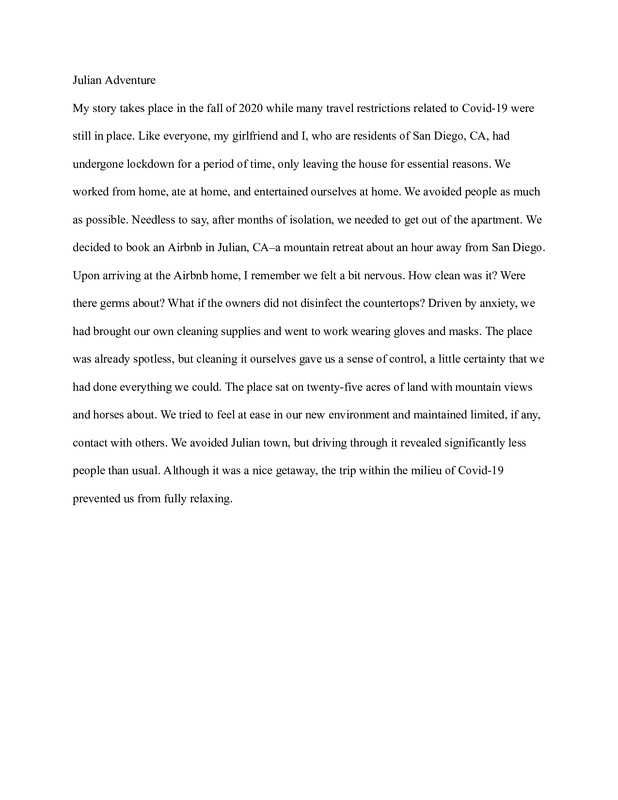 2020-10-22
2020-10-22Julian Adventure
Julian Adventure My story takes place in the fall of 2020 while many travel restrictions related to Covid-19 were still in place. Like everyone, my girlfriend and I, who are residents of San Diego, CA, had undergone lockdown for a period of time, only leaving the house for essential reasons. We worked from home, ate at home, and entertained ourselves at home. We avoided people as much as possible. Needless to say, after months of isolation, we needed to get out of the apartment. We decided to book an Airbnb in Julian, CA–a mountain retreat about an hour away from San Diego. Upon arriving at the Airbnb home, I remember we felt a bit nervous. How clean was it? Were there germs about? What if the owners did not disinfect the countertops? Driven by anxiety, we had brought our own cleaning supplies and went to work wearing gloves and masks. The place was already spotless, but cleaning it ourselves gave us a sense of control, a little certainty that we had done everything we could. The place sat on twenty-five acres of land with mountain views and horses about. We tried to feel at ease in our new environment and maintained limited, if any, contact with others. We avoided Julian town, but driving through it revealed significantly less people than usual. Although it was a nice getaway, the trip within the milieu of Covid-19 prevented us from fully relaxing. -
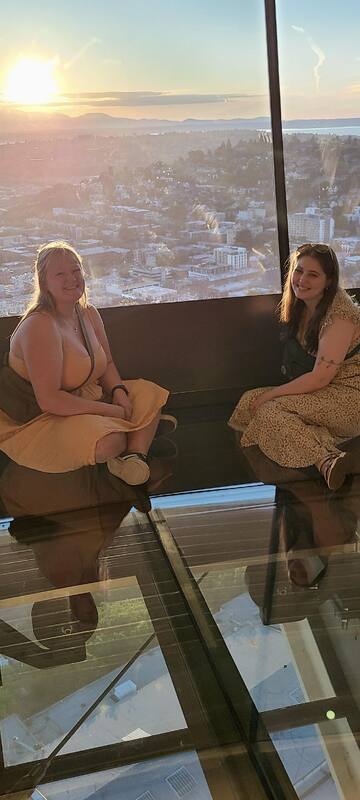 2023-07-13
2023-07-13Post-Pandemic Trip to Seattle
Like it did for many people, the start of the Covid-19 pandemic canceled multiple travel plans for me. I applied for my passport in 2018 with the intention of going on a study-abroad trip my junior year of undergrad. Instead of travel memories, I have a memory of sitting in my PoliSci class and discussing the news with my classmates that the university might shut down for a few days. We didn’t go back, and I still haven’t used the passport. Once travel restrictions were lifted it still took me a while to get back out into the world. The first trip I took was in July of 2023. I traveled from Minnesota to Seattle, Washington with some of my friends from high school for a week of sightseeing. We chose it because most of us had never been to the Pacific Northwest. It was my first time in an airport since December of 2018. I remember having quite a few lingering anxieties related to Covid, to the point where I was actually dreading the trip before we left (even though I ended up having a wonderful time). I had some struggles with health anxiety during the pandemic. Before tests were widely available I remember frequently being so paranoid I had Covid that I would convince myself I did and actually make myself feel sick with anxiety. Since restrictions have been lifted this has stuck around, and now takes the form of me getting excessively anxious about getting Covid before important events (like the trip, and my wedding just a few weeks before it). I also was nervous about going to the airport because I didn’t know what to expect in regards to how many restrictions would still be in place. It turned out there were no restrictions remaining in the MSP or SeaTac airports beyond some signs reminding people to not enter if they felt unwell (I am certain most people who make it far enough to see the sign still enter). Once the actual boarding of the plane went fine, I entertained myself with anxieties about the odds of someone on the plane having Covid and all of us breathing circulated air. I actually had Covid once in the fall before the trip, and got the highest fever of my life but was ultimately okay. Interestingly, this didn’t really ease my fears during the flight. Nobody got Covid from the Seattle trip (though we were probably just lucky) and instead I got some of the most precious memories of my life so far. I also had a surprising lack of anxiety once we got there. We visited a long list of places including most notably the Space Needle, Chihuly Garden and Glass Museum, Seattle Aquarium, Pike Place Market, and the National Nordic Museum. There were no Covid-19 restrictions remaining in any of these places. I had packed one reusable mask in my backpack in case I needed it, and it turned out the one time on the whole trip that I entered a space where masks were required (a small independent bookstore) I didn’t have it with me and had to borrow one. I still thought about Covid every time we pushed through a packed crowd in Pike Place Market, but more so than being afraid I thought about how during the peak of the pandemic I was convinced it was something I would never do again. I don't believe the pandemic is truly over even now, but I drastically felt how much things had changed in that moment. The picture I included to tell my story is of my friend Carlie and I on the top of the Space Needle (I am sitting on the right). We went back twice, and spent literally hours sitting on the glass floor and watching the city go by as it slowly rotated. It's one of my fondest memories of the trip. I’ve heard some people say the Space Needle is overrated, but as small-town Midwesterners we were pretty fascinated. I’m grateful to those who spent the pandemic under harsher restrictions in bigger cities like Seattle so that I can visit these places now. It was nice to feel so small looking down on Seattle after the world felt so small during restrictions just a few years earlier. -
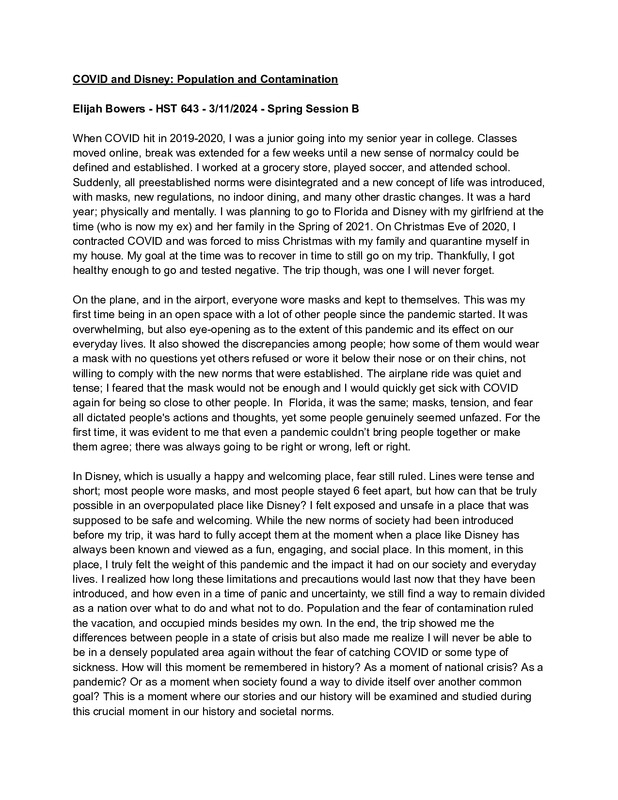 2020-12
2020-12COVID and Disney: Population and Contamination
This story discusses my trip to Disney and Florida following the pandemic, and the lasting effects it had on me, society, and the world as we knew it, as well as the differences among people in how they handled this event. -
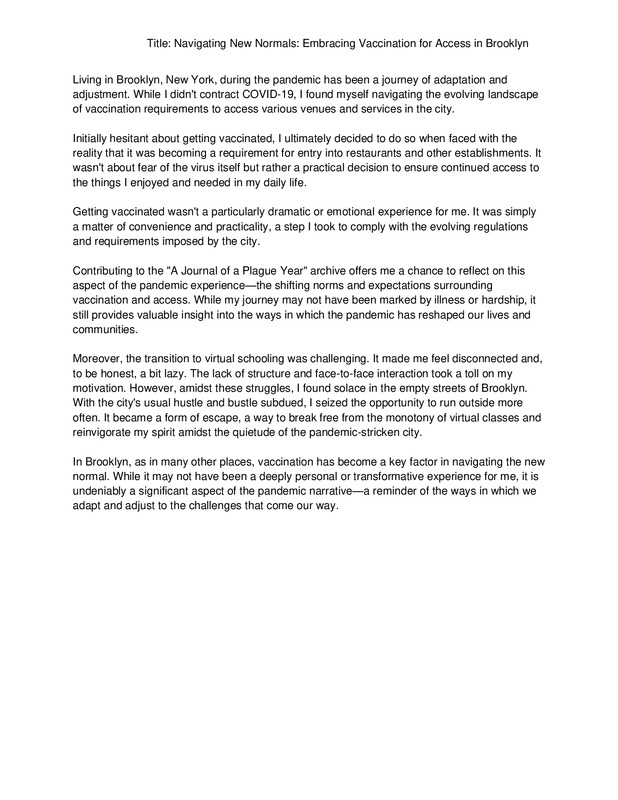 2020-07-07
2020-07-07Title: Navigating New Normals: Embracing Vaccination for Access in Brooklyn
This shows my point of view and experience to the pandemic -
 2021-03-09
2021-03-09Long Live My Mama
I feel like my mama story needs to be heard. We loss millions of people to it . -
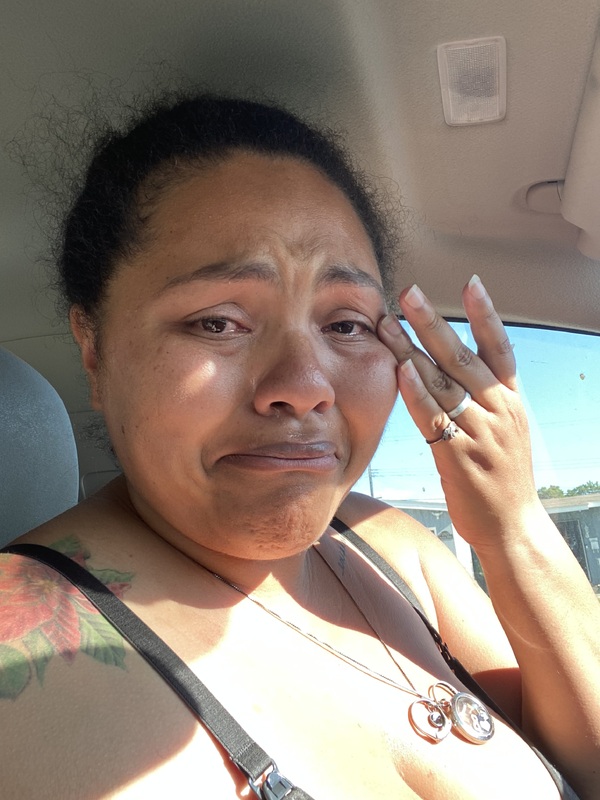 2021-02-17
2021-02-17It took my world
This is a photograph of my best friend, my mother. In December of 2020, we went to Disneyworld and came back with Covid-19. I was barely pregnant at the time, but my Covid symptom was only a cough. This cough would only hurt my uterus, so when I started to miscarry, I wasn’t too surprised. My mom, on the other hand, thought that her muscles were sore from walking around the parks for a few days. She had a cough and a bit of a fever, but was still walking around the house as we quarantined together. She was cold, which only ever happened when she was sick. One day, she didn’t leave her room because she was struggling to catch her breath if she did too much. She had me turn the heater on for her because of how cold she was under her blankets and comforter. She had been keeping her C-PAP machine on to give her the extra air support, but when we checked her oximeter, it was only at 70. So I called the paramedics like she asked me to, they came, we met them at the door, her vitals were taken, and they said that I could take her to the hospital or they could. I told her that I would drive. I had to take her to the emergency room that was not in our normal network because that’s what was open. I took her there with the expectation of getting her transferred the next day. When we called, the other hospital couldn’t take her because all of their beds were filled. So, she stayed there, and I couldn’t be with her because they were trying to keep the spread down. She was texting and FaceTiming me for the first 4 days that she was in the emergency room. On the 5th day though, she stopped responding. I called the hospital and they told me that she had spoken to her doctor and they had decided to put her on the ventilator to give her body a break for a few days. It was not a few days. On day 39 of her being on the ventilator, they lowered her sedation medication and she had no eye movement. So, I told them to let my brother go in and say his second final goodbye and to call me when they had ended her fight the next day. They called and said that she took a few seconds off of the ventilator before they called the time of her passing. I was alone now. My dad passed away in 2006 and my brother was a technical part of my family, but it was just me and my mom in the house still. Now, it was just me. A year later, I lost my home because I couldn’t get a loan approval to buy out my brother’s half of the equity. At that time, I was pregnant again with the baby girl that my mom dreamt of me having. This child that she had planned to be overly involved with, to play with, to snuggle, to kiss, and to have memories and adventures with. But now, the nursery would be someone else’s room. A stranger. Covid-19 took my baby, my mom, my house, my stability, and my will to love. I have been able to love my baby girl, but I am always comparing myself to my mother and thinking about how she could’ve been the best grandma. How she would’ve helped me. How we would’ve traveled to so many places together. And now, I struggle to pay rent on a single room. I leave my child at daycare 5 days a week and try to keep her there for each meal in case I don’t have enough to feed her. And I hide away from a lot of socializing because my mom was my favorite person to hang out with. -
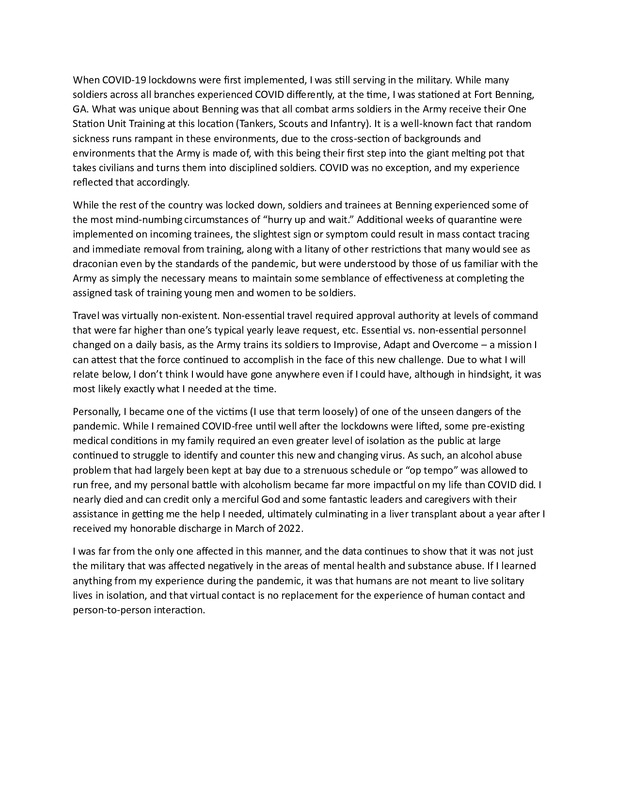 2020-03-31
2020-03-31Locked down, Locked in
I was a SSG in the US Army when the lockdown hit. The isolation let my personal demons almost get the best of me, but lessons were certainly learned and I pray we never get to that point ever again. -
2023-10-12
No Longer a Traveler
The pandemic has altered the way I view and interact with people and places. Although I have always been cautious of germs, illness, personal space, and keeping healthy, the pandemic has heightened my awareness. I am now turned off and disgusted by the thought of crowed spaces, movie theaters, gyms, airports and other places with heavy traffic. I no longer have interest in activities I once enjoyed and participated in. This has affected how I travel and how often. I once loved traveling, visiting new places, trying new restaurants, interacting with communities, and just being a “tourist”. After the pandemic restrictions were lifted, I had no interest in traveling and enjoyed being at home. Home was comfortable and safe. The first time I traveled after the pandemic was in 2022, I traveled to California to attend a conference, visit some museums and to do touristy things. I did enjoy my experiences, but it was truly exhausting. I was constantly worried that I had caught COVID or that I was going to catch it. By the end of the week, I was ready to go home and recover from the anxiety I had. It has been a year since that trip. -
0023-10-12
Happy Mother's Day 2021
In May of 2021, after nearly eighteen months of being apart, I was finally able to visit my mom and dad in Spokane, Washington. After driving five hours across Washington state, I finally arrived at my parents house. To say the least it was a very emotional greeting. When I arrived we greeted each other with many hugs and tears. Throughout the day we would just give each other random hugs, happy to be together again. My parents live in a retirement community that was very careful and followed the Covid recommendations to keep the residents safe. I was considered an essential worker as a grocery store worker. I didn't want to take the chance of exposing them to the virus since I worked closely with the public until I received the first vaccine. I also have two sisters that live in Spokane and were able to see them too. We still had to wear masks in most areas but that did not matter. Getting the family together, after such a long time, was all my mom could ask for on her special day. Happy Mother's Day. -
2021-04
Regret for a Trip Not Taken
This story is about travel that did not happen, but should have during the Covid-19 Pandemic. In mid-2020, my little sister Sarah was diagnosed with kidney cancer. She was married and had 3 children up in Seattle. When my family heard the news, travel was severely restricted and many people were still dying daily from the virus. I have my own wife and kids, so we all agreed that it wasn’t a good risk to go and visit. Besides, we reasoned, she hadn’t started treatment yet and she had good chances of beating cancer. So we waited it out. My sister and I talked frequently, and she told me that she was optimistic about her cancer diagnosis. Unfortunately, our Dad died in January of 2021 due to complications related to Covid (he had Parkinson’s also), and neither of us could travel to do any funeral service. In April of 2021, the pandemic had cleared up enough that most travel restrictions had ended, everyone was vaccinated, and the risk was lower. My older brother Sean had planned a trip to go to Seattle and stay there for a month to visit, help take care of kids and just be there. He urged me to go, at least for a week or so because he told me that he thought it wasn’t going as well with her treatments as Sarah had led me to believe. Because of Covid patients overwhelming hospitals, I don’t think she was getting as much good-quality medical care as she needed, though that’s my opinion. Anyway, I didn’t want to go on this trip. I don’t particularly handle death and dying well, and I didn’t want to go there and be basically sad and crying the whole time, and I was in denial about her health, so I didn’t go. A few months later, in June 2021, Sarah succumbed to cancer and died. If I could go back in time to do it over again, I definitely would have gone. I would have liked to walk around Seattle with her and take pictures to put on Facebook, our primary means of sharing memories, or take her kids out for a few hours to sight see and get to know them better. I regret, and always will, that I did not go and see her and her family there at the end. -
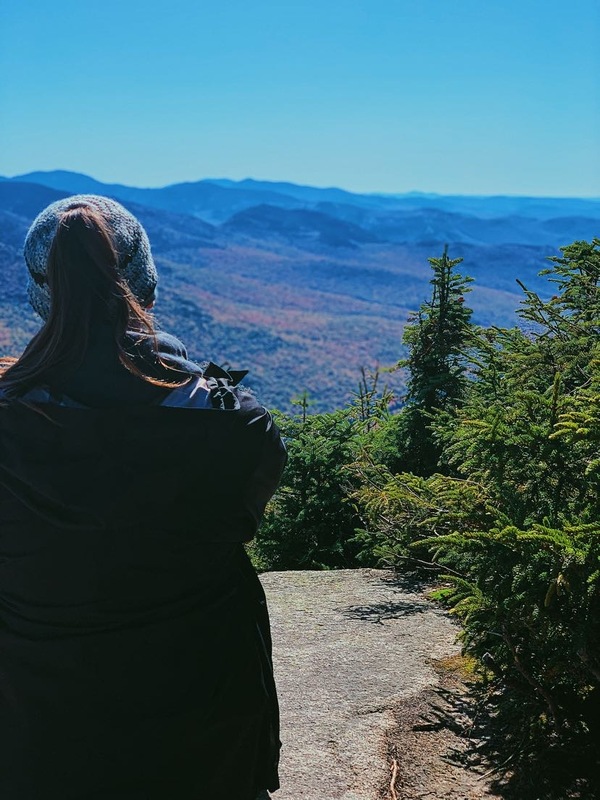 2020-05-08
2020-05-08Scaling Mountains - Overcoming Obstacles (and New Englands peaks) During the Covid-19 Pandemic
During the pandemic, I was lucky that I didn't lose anyone close to me. I know many people around me and in the world who watched their loved ones die from COVID-19. It has also had long-lasting health effects on many people as well. It is an ongoing conversation because people are still contracting the virus daily. Lockdown was a surreal moment for many in our ordinarily fast-paced world. The entire world stopped, and for once, we couldn't rely on our usual entertainment and schedules for distraction. This led to the development of new habits, which, unfortunately for me, were not just board games and binge-watching Netflix. Alcoholism had been at my doorstep since my senior year of high school, with my dependence on the substance worsening as the years passed. This is a genetic condition, and I have had countless family members struggle and die because of substance abuse, mainly alcohol. When the pandemic hit, I drank nearly every day, and this continued during lockdown with my roommate and a few friends. Not only was this dangerous because of the spreading pandemic, but it also worsened my mental health. Soon, my college shut down, and I had to move back home, where my substance abuse continued. My relationship had fallen apart when my ex moved back to India as he was on a student visa. The drinking and emotional isolation/strife led to a breakdown wherein intrusive suicidal thoughts plagued me. Something had to change; one night, I quit all substances and contacted my PCP about a mental health evaluation. I know my diagnosis was wrong, but it got me on the medication I needed to forget the intrusive thoughts and piece my life back together. My saving grace was my father and, eventually, my friends, who decided to pick me up and give me a distraction. This distraction became hiking mountains, a shared hobby of previous substance abusers. The chemicals released in the brain during these hikes and the physical exercise filled the void alcohol used to. It served it and began to heal the void left by years of mental health struggles and abuse. Like in this picture, the world's problems and my own seemed small when I was on top of a mountain. Not only that but also hiking is a very social-distance-friendly activity. The love for hiking fostered in my childhood was rekindled during the pandemic and remains one of my favorite things to do. My father and I are attempting to walk up all New England's notable peaks. -
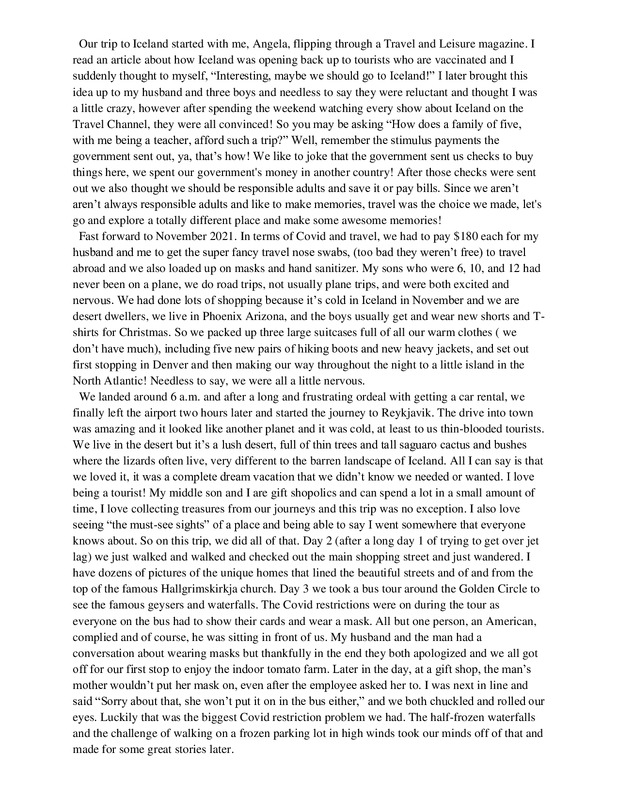 2021-11-19
2021-11-19Our Adventures In Iceland
I've written a story sharing our Covid trip to Iceland that we were able to take after the restrictions were lifted. I don't think we would have gone if the circumstances were different, it was a life-altering trip for us, something joyful in the midst of a world crisis. -
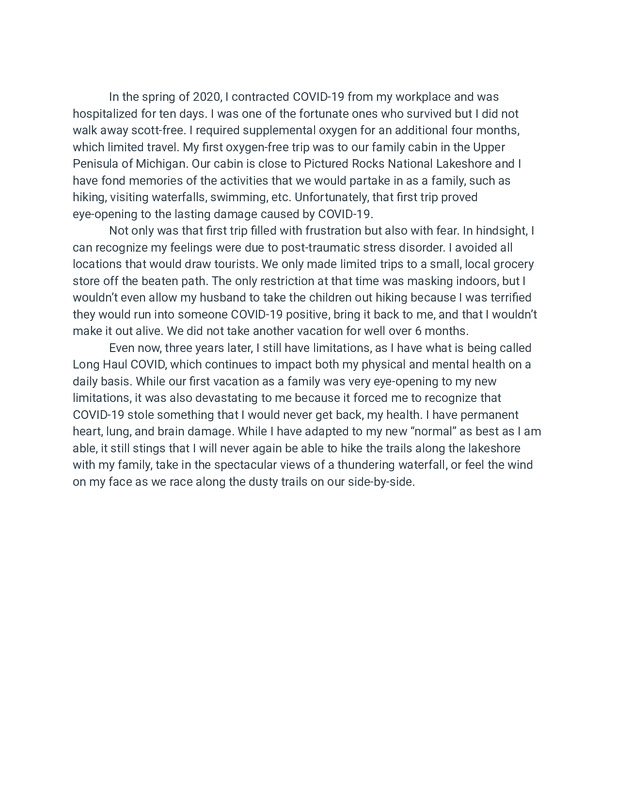 2020-08
2020-08Memories are Like Waterfalls; a Post-COVID-19 Recovery Vacation
As a survivor of COVID-19 with long-lasting damage, this memory still brings feelings of anger and fear to the surface. It takes place at a family cabin that was the epicenter of many happy memories all the way from childhood through becoming a parent myself. That first trip back forced me to see all that COVID-19 had stolen from me and would continue to steal from me for the rest of my life. -
2020
Continuous Travels Throughout The Pandemic
As an Active Duty Soldier during the COVID-19 pandemic I was able to travel; albeit my movements were extremely controlled and job-related and not for leisure. On 13 March 2020, when the entire Country literally reacted to and shut down due to COVID-19, I was out of town and hours away from traveling back to my duty station. The sudden reality we were all faced with felt like The Twilight Zone, especially since it was also a Friday. In May of 2020, I drove to my hometown of San Antonio, TX. My mother was a COVID patient in the ICU, and I needed to get home to help take care of my father. Thankfully, my mother recovered, and I returned to Tennessee, where I was stationed at the time. The COVID restrictions from Tennessee and Texas could not have been more different; whereas Clarksville, Tennessee treated public separation and mask-wearing with a laissez-faire attitude, San Antonio was very strict with its public safety ordinances. A few months later, I deployed to Iraq; transiting to and from the Combat Zone was extremely restrictive. Prior to the Pandemic, we could enjoy local sightseeing if we had a layover in Spain or Germany; naturally, during COVID we were confined to our lodging. However, in January of 2021, as travel restrictions began to lift ever-so slightly, I participated in a unit training exercise in California. To my surprise, we had to fly commercially to Las Vegas, NV. To ensure 6-foot separation, we were each allowed our own rental vehicles, and our own hotel rooms while we trained in the California desert. In all my years in the military, that was the only time I wasn’t required to share a rental or hotel room with anyone. After we had concluded our training, we commuted back to Las Vegas. The original plan was to use military lodging on Nellis Air Force Base, however our Commander allowed us to find our own hotels in Las Vegas, as our flights would not depart for Nashville for another 36 hours or so. At that time of course, no one was traveling or booking rooms; I was able to find a room at the 4 Queens Casino on Fremont Street for forty dollars a night. This turned out to be far more cost-effective to the US Government, as we would have paid around ninety dollars a night had we stayed on Nellis AFB. Restaurants in Las Vegas during the Pandemic opened no earlier than noon, so we had a lot of time to kill in the morning. We walked up and down Fremont Street, the Strip, and it felt as though we were the only group of people in the city. Casinos were empty throughout the day and remained empty well into the night. Being thirsty Soldiers, we visited a Speakeasy and a couple of restaurants; again, with the eerie feeling like we were the only “tourists” there. We even visited the Mob Museum and enjoyed all the history and Prohibition artifacts at our leisure! Between multiple quarantines, working remotely, COVID tests, memorandums clearing us to leave the country, and the eventual vaccination, we continued military travel. It was impossible for my unit to cease all operations due to the Pandemic; we adjusted on the spot and continued to learn throughout the entire experience. It was impossible for me to narrow my travels during COVID to just one single memory; rather it felt like one continuous surreal dream. Today if anyone asks where or how I spent Lockdown, I have to ask, “When during the Pandemic are you referring to?” -
2020-06-18
Florida to California
In June 2020, I had to drive from Florida to Northern California for a new job. I didn't fly for fear of Covid and I had a car to move. The journey took me 5 days. The first day was from Tampa Florida to Mobile Alabama, the second day was from Mobile Alabama to Dallas Texas. The third day was from Dallas Texas to Albuquerque New Mexico. The forth day from Albuquerque to Cedar City Utah where my sister lives. Finally from Cedar City Utah to Truckee California. Before the trip I had isolated myself for fear of getting sick while travelling which I feared greatly. My general approach was to eat breakfast at the hotel, get lunch in a drive through, and have uber eats deliver food to my hotel for dinner. Along the journey it was interesting to see how strict the rules were depended greatly on where you were. In Texas I stopped at a donut shop for coffee and found a large group of elderly men sitting around drinking coffee and eating donuts without a single mask to be found. This group was clearly not concerned about Covid. However, when i drove through Navajo country in Arizona, the rules were very strict and only drive through food options was available and I had difficulty finding an open bathroom in the entire area as no gas station or restaurant was allowing people inside. I also remember listening to E Street Radio on satellite radio and Bruce Springsteen was reading the obituaries of people who had died. I remember that being a striking moment throughout all of this. -
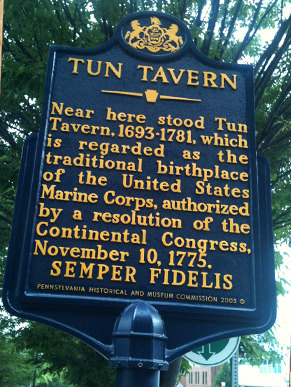 2021-03-12
2021-03-12Philadelphia Trip Covid Combat Corner
The pandemic was a very depressing time of limited activity that divided many by political responses. March 2020 is when the U.S. responded with stay at home responses followed by social distancing and testing. A year later in that same month of March, I was cornering my teammate for his fight for Cage Fury Fighting Championship in Philadelphia where some COVID measures still existed such as masks that we utilized on the plane and even during the warm up of the fight. Tests were required that had a swab impaled up our noses, but in hindsight it was a great experience especially as a historian where I toured many historical sites such as Benjamin Franklin's grave. -
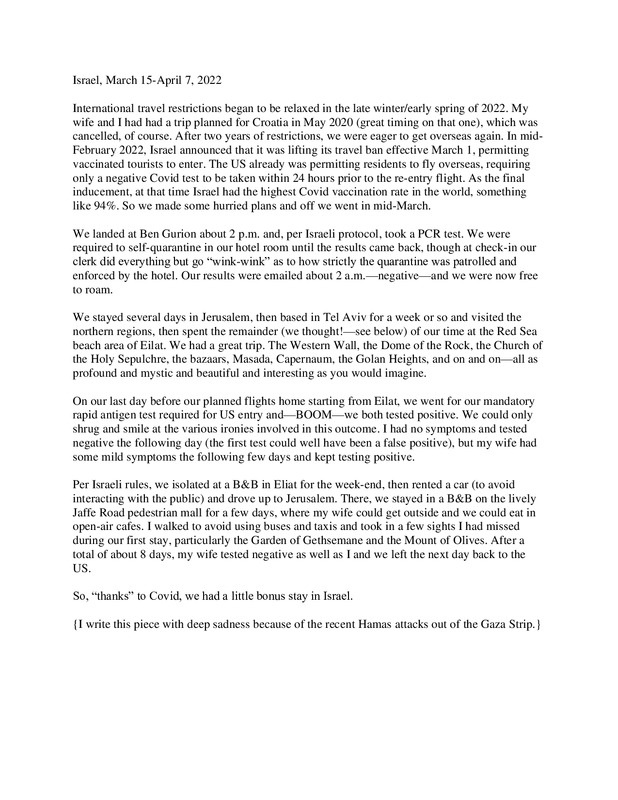 2022-05-14
2022-05-14Dealing with COVID in Israel two weeks after the lifting of the travel ban
This story relates the issues my wife and I had in dealing with Covid restrictions on a trip to Israel, just two weeks after the travel ban had been lifted. The story has no great significance except, perhaps as an example of "life is irony." While the story itself is trivial and meant to be amusing, I do share it here with a profound sense of sadness over the recent Hamas attacks and their consequences. -
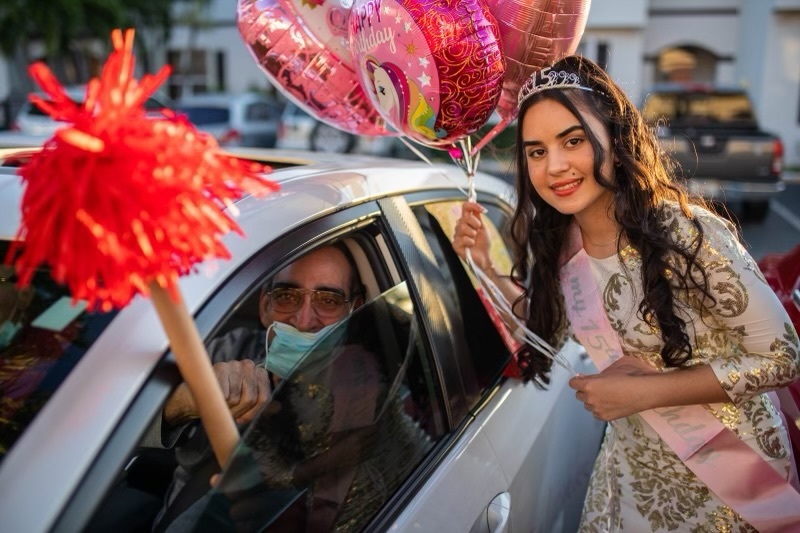 2020-05-06
2020-05-06Drive Through Birthday
On May 6, 2020, my childhood best friend officially turned 15. It may be just another birthday for most. However, in Hispanic culture, it means a girl's shift from childhood to womanhood. Usually celebrated by parties filled with hundreds of people, princess dresses, cultural food, music, and gifts. Due to the pandemic, it was diminished to a drive-through celebration filled with masks and distance between loved ones. It was a memorable birthday; nevertheless, a significant part of the typical Hispanic cultural experience was stripped away from her. -
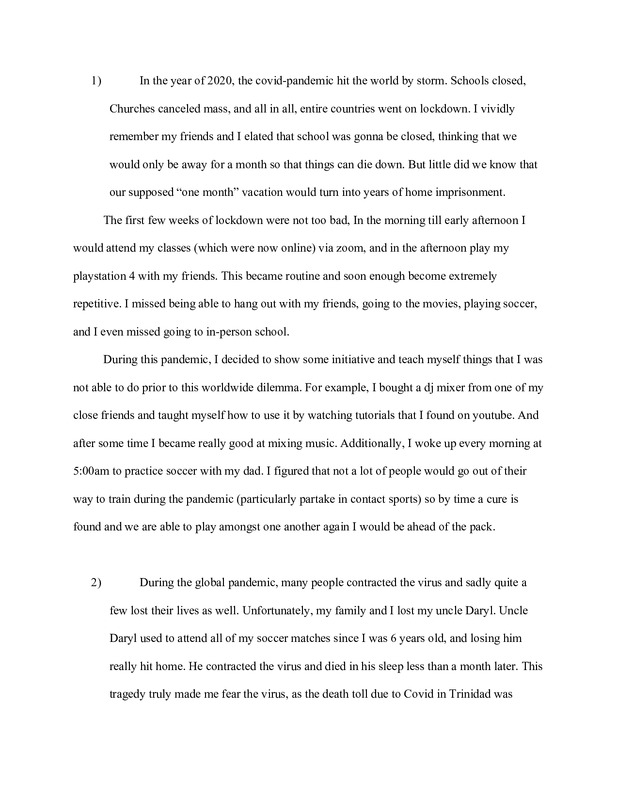 2020
2020Life of a Trini during the Covid 19 Pandemic
My story talks about difficulty I experienced during the pandemic -
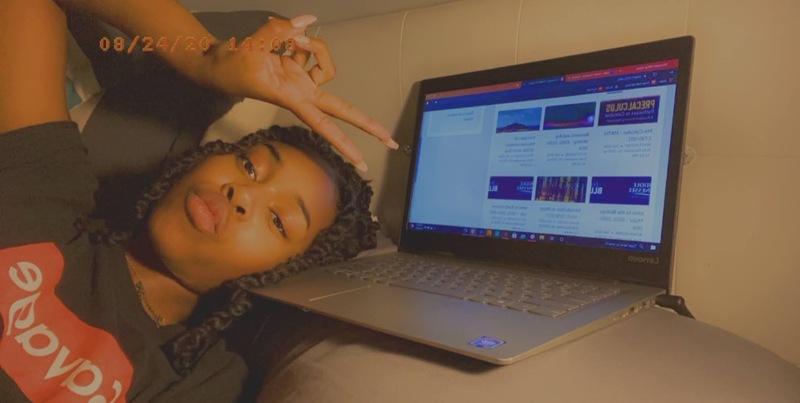 2020-08-24
2020-08-24First Day of School Picture
The picture I chose to add to the archive is my first day of school on August 24, 2020. In this picture, I was laying in bed with my laptop because everything was online. If you were lucky, you got a professor that taught class on Zoom. That is the closest to being in a regular classroom as it got. You were able to see your classmates (if they turned their camera on), you could have discussions with everyone, ask the professor questions and get immediate answers. On the other hand, you could get stuck with a professor who chose to use youtube videos and websites instead of teaching. These were the worst, poor to almost no teacher-student interaction, just discussion boards and Google. It was impossible for me to learn like this, I felt like I was not being taught! It was always stressful when trying to do assignments for classes like this because I did not understand the curriculum. If I needed to contact my professor, I just had to send an email and hope they would email me back soon with answers. Sometimes, I would not get a response until days later, a few times I never got a response. After a while of this, I started to feel miserable, stressed, and depressed. My grades started getting lower and lower and knowing how much school costs, knowing that I was going to lose my grants and scholarships because I was failing, I started having anxiety attacks. In my head, I kept saying, “I cannot learn like this, I know I am going to fail, so why keep trying?” Things got to a point where I would open my laptop, look at my assignments, cry, and then just close my laptop back up. I lost all my motivation and I lost sight of my dreams to be an optometrist. I remember the day that I dropped out, the defeat that I felt, feeling like a complete failure. -
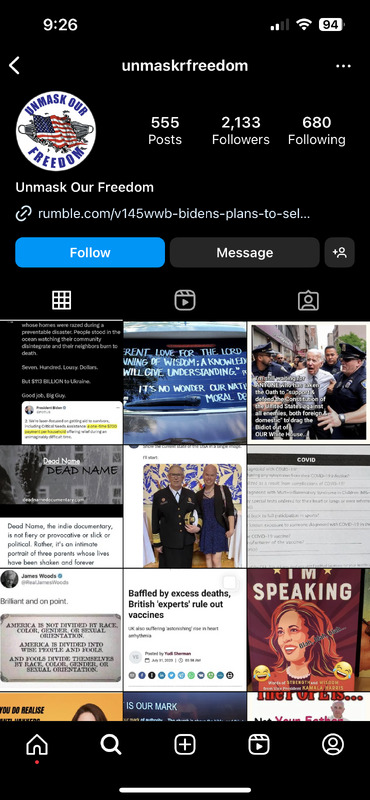 2023-08-30
2023-08-30COVID paranoia alive and well in 2023
At a stop light this morning, my attention was grabbed by a car with lots of writing on it. I wish I could have gotten a picture, but the light turned green before I could. The car message was about Marxism and how fear controls its movement. The message expressed that recent events have all been staged in order to control society and went on to predict that mask mandates would be back on September 15. The message ended by encouraging people to resist the future mandate in order to retain control of our society. I was very intrigued to see that there are some people who are still very vocal about topics such as this and very loudly are telling people not to live in fear when they are the only ones who seem to be living in fear these days. I read a hashtag on their car and looked it up when I got home. This page belongs to a person (or movement) that is very anti-mask, anti-covid vaccine, and anti-mandates. They are part of the extreme right politically and very religious. I’m curious to see if anything were to happen on the 15th and if not, how this page will respond to the “normality” of September 15. I guess we’ll see in two weeks. -
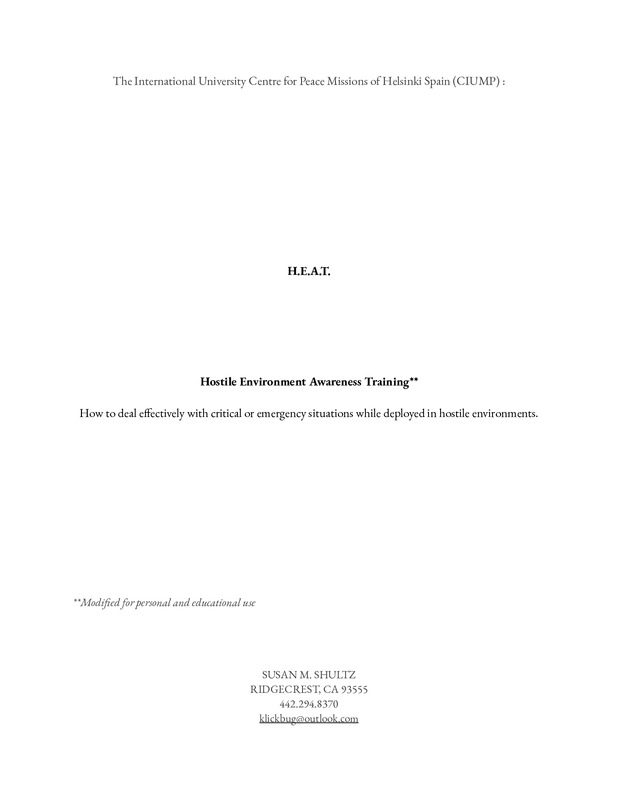 2020-04-14
2020-04-14Training Terrorism
Ongoing internal displacement. -
2023-07-21
A Year of Betrayal
This doesn't need to be long I am just glad to have a way to express how incredibly disappointed I have been throughout the course of this pandemic. In the first few months after the outbreak, most of us relied heavily on the public governmental briefings by Dr Fauci and others, and we eagerly awaited the development of tests and vaccines by the pharmaceutical industry. We trusted that our government and our doctors were working earnestly to provide good solutions to a terrible problem, quickly. But if we fast forward a few years, what a horrible change has transpired! Pretty much everyone who we trusted at the beginning of the pandemic has been proven either a downright liar or to have been working for their own private interests all along. Dr Fauci couldn't get his story straight - repeatedly - over simple matters, and lied again and again about the connection between the virus, the government, and the Wuhan virology lab. Though various remedies (like ivermectin) were decried as malicious and dangerous, we now know that the pharmaceutical companies we were busy trusting were pushing to consider the use of ivermectin medical malpractice, because they wanted an emergency use authorization for their insufficiently tested and experimental vaccines. Some of us already knew we couldn't trust our government, but most of us hoped that we could at least trust our doctors. What a disappointment. -
2022-02-26
My Personal Experience with COVID-19
It was Christmas of 2020, and my eighty-four-year-old Dad was really sick. Up until then he had been healthy. He worked out at the gym every day and always went for coffee at Starbucks afterwards. I call him every day, and I could tell he was under the weather, but he didn’t want to admit he had COVID-19. He was sick for several weeks but came over on Christmas Eve to have dinner with our family. I remember being slightly irritated that he did come over because we could have brought him dinner at his house and minimized exposure to everyone else. Fortunately, our family and my sister’s family did not catch it that year. Oddly enough, we wouldn’t catch it until the following year. I remember being sort of surprised that we didn’t catch it because everyone around us had it. When the gyms and restaurants and grocery stores all closed, I would walk around our subdivision everyday to continue my exercise routine and I noticed I was tired and had shortness of breath. I remember going in for my annual physical with a face mask on and telling my doctor my symptoms. I remember him saying that those symptoms were too early to be COVID-19 and was probably a milder version of the flu. I was doubtful due to being heavily exposed by my dad, as well as so many others who had no idea they had it but were technically “super-spreaders.” My sister’s family and our family caught Covid within a week or two of each other despite not having any contact and being vaccinated the prior year. My husband and I both opted for the Johnson& Johnson vaccination because it was traditional with just the one shot. Our friend, who worked with my husband also got the same vaccination. My husband and I were sick after the shot, but we knew from friends that we would be. It lasted maybe a night and then we felt better the next day. Our friend wound up in the hospital after her vaccination with a small intestinal blockage which she blamed on the shot. She stayed in the hospital for about a week, but other than some follow-up monitoring, she is ok. Shortly after that, we read in the news that several women had died from embolisms after receiving the vaccination. Our daughter, who has special needs, sees many doctors and I remember telling him that I just gotten vaccinated and now there was this complication. He was very reassuring and said that the women who had passed away probably had a serious and pre-existing condition. He told me to stay active for the next week or two and drink lots of water which I did, but it was the longest two weeks until we were cleared from the risk. We did end up catching Covid in February-March 2022. It had been a normal week. I went to the store, gym, did carpool, walked the greenway, but I felt slightly off all week long. I remember coming home and making dinner, but I was exhausted and told my husband that I was unable to have dinner with everyone that evening. Sure enough, I was running a low fever. I took an at-home COVID test, and my results showed I was positive within a few seconds. I immediately quarantined in our bedroom for the next several days. My husband caught it about a week later, but his symptoms were different than mine. He had a bad sore throat and was cold and shivering for a couple of days, and had a cough that lingered. Our daughter, who has severe Cerebral Palsy, caught it next but thankfully she only had mild symptoms for two days and recovered almost immediately. Our son caught it last, and he had a very bad sore throat for a week. We made it through, and consider ourselves fortunate that we recovered without long-term issues. -
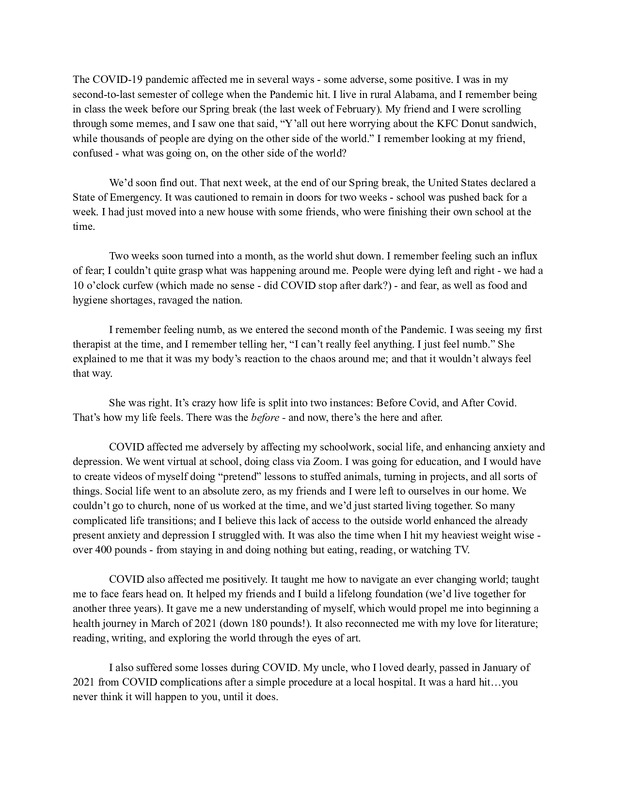 2023-07-19
2023-07-19COVID-19 Archive Story_H. Crowder
I have uploaded a personal story of how COVID-19 impacted my life; and how, in my mind, there is a before and after, two different sections of my life. I also observe the changes that were influenced by the Pandemic. -
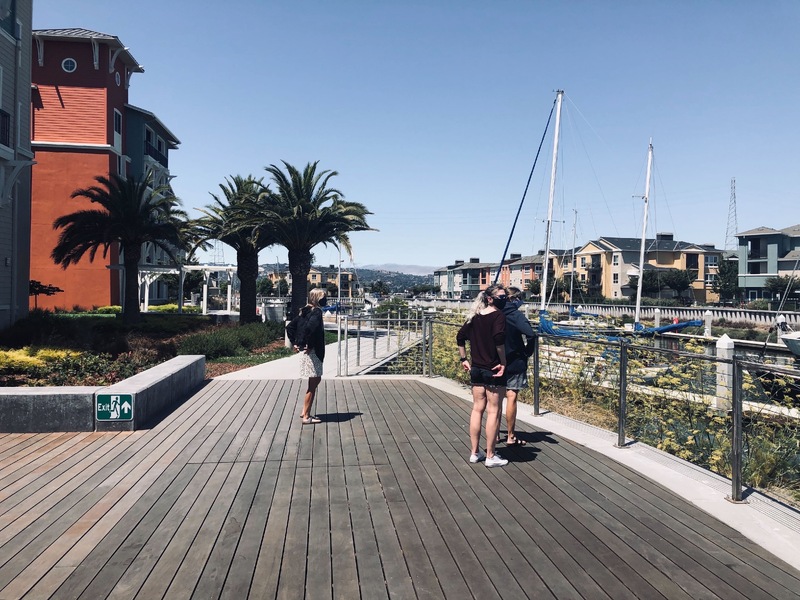 2020-07-14
2020-07-14Cross Country Move During the Pandemic
In the spring of 2020, my sister finished up her post-doctoral program and needed to find a job. Unfortunately, if job hunting wasn't hard enough, the Covid-19 pandemic hit in March 2020, and in-person interviews were canceled as companies went remote. After a number of Zoom interviews later, she landed a job. The only issue - that job was in California, a state that had responded to the pandemic with some of the strictest restrictions. In July, the moving truck was loaded, we hopped into our cars and began the two-day drive from Texas to California. We had originally planned to take the southern I-10 route through New Mexico, but before we left, we learned New Mexico had implemented a 14-day quarantine for anyone entering the state. Since we weren't 100% sure if that applied to people just passing through, we decided to go the more northern route staying the night in Colorado and Nevada. While both hotels we stayed at assured us they'd taken extra precautions cleaning the rooms, we followed the CDC-suggested guideline of bringing cleaning supplies and wiping down hard surfaces when we got our rooms. I'm a bit of a germaphobe, and this was the first time no one gave me funny looks when I entered a hotel with a can of Lysol wipes. Overall, besides wearing a mask in public, the road trip to California was similar to road trips pre-pandemic. Things got a little bit more restrictive as we got into Redwood City. Unlike in Texas, masks were required indoors and outdoors if other people were nearby. Since it was a lot cooler in California, I was mostly fine with that requirement. With most indoor attractions either closed or open only to a reservation, we decided we'd go to the beach while we waited for the moving truck to arrive. Apparently that was a popular idea, so it was hard to find a part of the beach without people around so we could take our masks off. Besides the mask mandate, the only other restriction that impacted our trip to California was that California had closed indoor dining, so all our meals had to be eaten curbside or to-go. We found a few restaurants with outdoor seating, but mostly it was easier just to get take-away and eat it on the floor of my sister's new apartment. Since we weren't flying and we really weren't in California to do tourist activities, traveling wasn't that difficult. However, while it wasn't difficult, it was terrifying. Our trip to California was pretty early in the pandemic, and there wasn't a lot known about Covid-19 yet. Additionally, there were countless stories on the news about people ending up in the hospital and dying from the virus. If we hadn't needed to move my sister in 2020, I don't think I would have traveled at that time. In fact, even as information came out about Covid-19 over the following months and years, I still wasn't comfortable traveling. My first trip since moving my sister was actually just this past June. -
2021-06-03
Traveling overseas during Covid
My wife and I decided to travel to Greece immediately after the initial lockdown and when the travel restrictions were lifted. It was a difficult decision to take such a long trip during the pandemic, and especially since we had to travel through Germany in order to get to our final destination. Restrictions varied among countries, and the fear of another lockdown before returning to the United States made our trip quite stressful. Despite the circumstances, we decided to follow through with our plans because my wife needed to get a medical procedure done, and the doctor of her choice operates in Greece. After checking and double-checking all the required travel documents, we found out that we needed to provide negative Covid tests at the airport in Chicago in order to board the plane. It was unclear whether we would need to take another Covid test in Germany and upon arriving to Greece, but we both got our tests and headed to O’Hare international airport. When we entered the airport, we couldn’t believe the long lines ahead of us. We made sure to get there 3 hours before our scheduled flight, and we waited in line so we could show proof of our test results. After a 40-minute wait, it was finally our turn. We handed in our tests and waited patiently while the lady at the desk was looking at them with a perplexed look on her face. “You can’t get on this flight”, she said. “Your tests expired 30 minutes ago. You need to get new tests”, she added. We were stunned since we had both gotten out tests the day before, and the rules stated that the tests would be valid for 24 hours. The airline employee was telling us that we had missed the 24-hour deadline by half an hour. When we realized that the rule was very strict and there was no way we could get on the plane without taking new tests, we found out that we could get tested at the airport and get the results within 20-30 minutes. We both rushed to get new tests, but we were surprised to find out that the cost was $200 for each test. That was an added expense of $400 that we hadn’t planned for, the trip was very expensive, and we also had to pay for my wife’s medical bills in Greece. It was Wednesday evening, we would arrive in Greece on Thursday evening, and my wife’s appointment at the hospital was Friday morning. If we didn’t make that flight, we wouldn’t arrive in Greece on time for my wife’s scheduled operation. We had no choice but to get tested. While all of that was happening, time was going by and there was a risk we wouldn’t make it to our flight on time. My wife got so overwhelmed and stressed out that at some point she sat on her suitcase and started crying in the middle of the airport. I gathered all my strength and patience and helped her get up and pull it together so we could run for the tests, get the results, and run back to check in. At that point I realized that we weren’t the only ones going through that situation. There was chaos around us, people arguing with employees, getting upset and shouting, other people crying, people who didn’t speak English and were trying to figure out what to do, families with kids running around frantically, and everyone was complaining that the rules hadn’t been clear. It was a huge mess, and we were in the midst of all that trying to get everything done. We were able to get on a different flight that night, and we made it to Greece safely and on time for my wife’s hospital appointment. When I reflect back, I realize that there was indeed a lack of clear rules, and the whole situation could have been avoided if the airlines had provided more accurate guidelines. I have traveled internationally hundreds of times in my life, but I had never experienced anything like that before. I understand that the situation was new for everyone involved, and when I think back, I don’t get upset about it anymore, but that was definitely one of the most stressful travels I have ever had. -
2022-06-01
Covid Europe
My family and I really like to travel, like a lot. We usually do a big vacation every year, and Covid-19 really threw a wrench in our annual plans (as it did to every single person alive). March of 2020, my family and I had traveled to Washington D.C. When we got back home to Utah, not even 24 hours later, Washington D.C. had shut down entirely. We felt lucky we got to go, but hopeful this shut down would only be two weeks. Fast forward two years, and we (again, like the rest of the world) were unable to go anywhere. My sister and I had gotten Covid-19 in November of 2020, and then the vaccines started to roll out. We had heard that if you were fully vaccinated, places were starting to slowly open for those individuals. We thought since we already had Covid-19, why not get vaccinated so we could travel? So, my mom, myself, and my sister all got vaccinated. Solely to travel. We are by no means 'anti-vaccination' people, actually quite the opposite. But we did have the normal hesitations of getting this vaccine just to such little prior research. Regardless, we got the vaccine. We started looking at places where we could go, from cruises to domestic travel to international. And then, the booster comes out. The rules are now that you have to have all three shots. And then, I get Covid-19 again in November of 2021, after having been fully vaccinated. Finally, we start to plan a Europe trip for the summer of 2022. Every plane, train, and automobile that would take us to and around Europe required a valid Covid-19 vaccination card. There were so many Covid-19 tests we had to take prior to departure from the US, then when we got to Europe, and then when we were getting ready to return home to the US. We had to fill out numerous forms verifying that we were not sick and had not been sick in the previous 14 days. While we were in Europe, the mask mandate had lifted for everywhere but Austria, but we didn't know that. We went to board an Austrian airlines flight without a mask, and we were then told we could not fly without a mask. We had to beg the flight attendant to give us one, as we didn't know (they were not nice about it). Keeping up with everyone's different rules and regulations and testing and forms definitely made our trip more difficult than it would be now. -
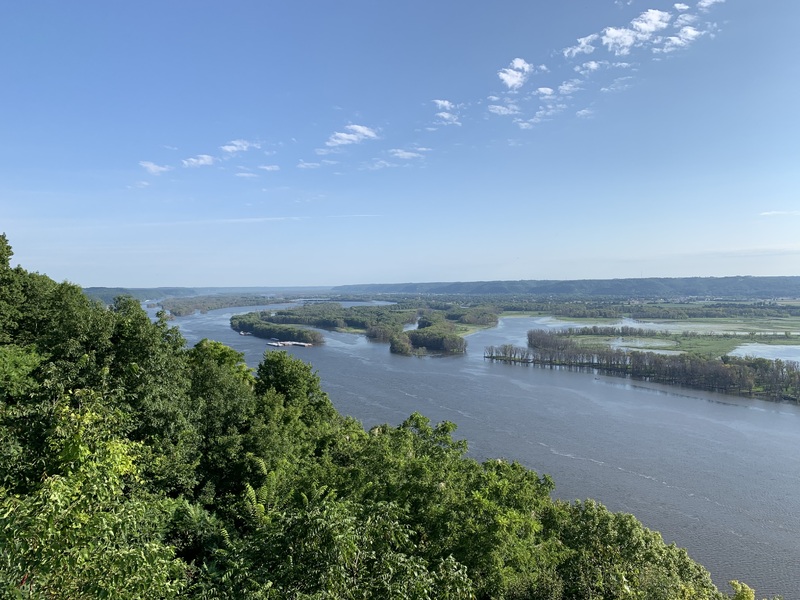 2020-08
2020-08Tourism During the COVID-19 Pandemic: 2020 Mississippi River Social Distancing Trip
This photo was taken along the Mississippi River in August 2020, shortly after stay-at-home orders were lifted in the Midwestern U.S. but still when other states (ex: New York) had tighter restrictions and 14-day quarantine policies upon arrival. My family chose to take this drive because most attractions were outdoors. We traveled here because it was extremely easy to escape crowds and still provided excellent scenery -- and I always enjoy going to more remote areas for that reason. One thing I remember is not visiting any restaurants due to fear of contracting COVID; we ordered all of our dinners to go and had a picnic lunch every day. Since this photo was taken, I have traveled to many other destinations, as I received my vaccines in early 2021, and felt more comfortable interacting with the public. -
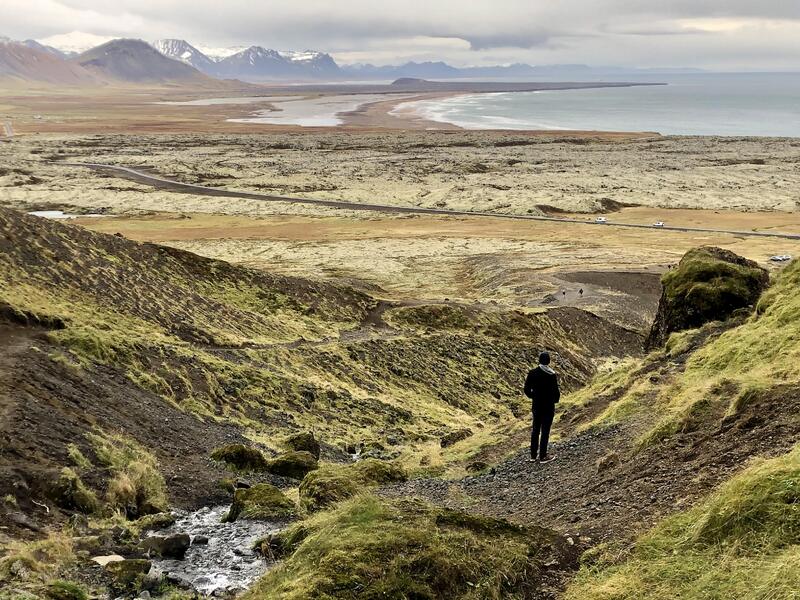 2021-10
2021-10Woodcrofts in Post-Pandemic Iceland
First, let me say that I am not a big traveler. I was never bitten by the travel bug, and I had no strong desires to see the world. A bit controversial, but I remember feeling even just a few months of lockdown during the COVID-19 pandemic that I needed to get out. I needed to escape my house, not because being quarantined and working from home with my husband was problematic or bad as far as our being with one another 24/7, but I just felt very confined and small, almost suffocated. There’s a difference, I think between choosing not to travel or leave your house and not being able to leave your house because of guidelines and the risk of spread illness. My husband and I had planned a trip to go to Iceland in September of 2019, but I just started a new job and couldn’t get time off that soon after starting, so we pushed it off to – as luck would have it – March 2020. In fact, it was planned for about a week or so after the entire world shut down and said “stay home.” At that point, we were “refunded” our tickets and accommodations, and were in this place of not know when or if this trip would happen. By refunded, I mean that the airline gave us a credit for the amount needing to be spent within a year after this date. So we felt in a bit of a dilemma and unsure of what to do. The news of the pandemic and the guidelines were – understandably - constantly shifting, and we were looking at international travel, so we had to frequently check the U.S. travel restrictions as well as Iceland’s restrictions and compare. Even then, restrictions fluctuated, at some points saying travel was allowed on one end, at others, if you test positive you may have to stay there for your entire quarantine period in a designated space away from others, extending your stay for potentially a month. It was a force to even consider planning. Finally, the stars aligned, and we were able to schedule our trip for October 2021, two years later that we had originally planned, but we were going and excited, if a bit nervous. I remember from the day we picked the flights looking up the travel restriction websites every day. I bookmarked the U.S. and Iceland’s sites to check to see if anything had changed in terms of guidelines or cancellations. We knew that we needed to schedule a covid test about 1 week prior to the flight and upload and bring proof of a negative result for the airline. We had been vaccinated, so we had to bring our cards for verification at customs. We also at that point, scheduled our return flight’s covid testing in Iceland to make sure that we had another negative result so we could come home. It was incredibly stressful trying to schedule all this, some sites were booked up, we had to take time off of work to get available appointments before going, all while reminding ourselves this is supposed to be a fun trip, a vacation in a country neither of us had visited before. Luckily, everything by way of travel went well. At that point, being in such a crowded area, like an airport, felt strange and uncomfortable. Everyone wearing masks, but still getting closer to us that we were used to now. We had heard stories of how planes are breeding grounds for covid, the air was recycled, so if someone on the plane is a false negative, they’ll give it to everyone. But we landed 6 hours later, and were relieved to do so. Despite not seeing a single puffin, our week in Iceland was absolutely fantastic; however, I can’t say that it wasn’t hindered a bit by covid and the transitioning public guidelines. After planning this trip for two years, we had read and marked up a number of travel guides that suggested areas to visits, restaurants to try, and trips to take while there. None of these books were equipped to prepare us for what vacation would look like post-pandemic. On one side, the sites and streets, even in the city of Reykjavik, were not nearly as crowded as we had read and expected it would be, which, for someone like me, who gets incredibly overwhelmed when around too many people, was perfect. We were able to visit museums, go on a virtual flyover of Iceland’s landscape, and see sights with no line or trouble. On the other hand, many store, restaurant, and attraction hours had changed or were complete shutdown, and were not updated on Google or on company sites. Occasionally we would finally reach a destination and find it was closed, but we understood that this was a small price to pay overall for a trip to Iceland so soon after things re-opened. One restaurant we stopped at in a small town south of Reykjavik was completely empty, we were the only customers from when we walked in to when we left. We were able to talk to the owner, who was saying that this is what it has been like for them since the start of the pandemic and restrictions on travel, especially international travel and tourism. It was a family-owned restaurant, where the owner and his wife sold art and homemade Nordic pieces on one of the tables in the back. They relied on tourism and the income of international visitors, and they said that this was the hardest part of the pandemic for them, seeing Iceland, a huge tourist spot for years, now hit financially and, really their way of life, changing because of this long ban on travel. For our trip across the country, fortunately, as it is, my husband and I are moderately outdoorsy people, so most of what we wanted to see or wanted to visit was outside and didn’t have the same restrictions that we found in town. We were able to spend a day at the Blue Lagoon, climbing a relatively recently active volcano, walk on the black sand beaches, and just drive around, climb out of the car and hike up a hill for the view. Early on, we decided to abandon our strict itinerary and just think of what we might want to do the next day and plan from there. It was jarring for someone like me, who is almost too reliant on structure and order, but the flexibility worked better and developing that mindset of being adaptable in this post-pandemic time helped combat the frustration and panic we felt after realizing so much had changed from the typical and expected. A stark difference we noticed while there was the general feeling towards covid-19 guidelines and vaccinations there compared to the U.S. at the time. Since the start of the pandemic, so many people were outspokenly skeptical and against the restrictions and guidelines in place and the vaccine, but we never really experienced any of that in Iceland. Rules and guidelines were quietly followed wherever we went, wearing a mask or maintaining distance, there was never a fight or resistance to this. We never saw or heard of any anti-vaccination groups or protests, as we had experienced both where we lived and on the news across America. All in all, our trip coming out of the pandemic was great, if not a bit unexpected because of the guidelines and transition period that came from international travel post-covid. -
2023-07-13
My trip to Xinjiang
For myself and many others in China, people were faced with policies and travel restrictions that were put in place due to the Covid19 pandemic. These policies and restrictions included, but were not limited to: quarantines, frequent nucleic acid tests, scanning a code in order to enter all sorts of places, and working from home. These covid policies and travel restrictions were finally, and fully, lifted this past winter, in January of 2023. This summer would be the first chance my family and I have to travel, and we will actually be starting our trip tomorrow, on July 13, 2023. As this is the first summer after covid policies were lifted, I’m expecting many places to be crowded. My wife has already done some research and has come across some videos on social media that shows some scenic spots that are crowded. As for the trip, we will be going on a road trip to Xinjiang, which is China's westernmost territory. We chose this place because we have never been there and have always wanted to visit. It is supposed to be one of the more beautiful places in China. While we will visit some urban locations, they will not be our primary focus as we are more interested in natural scenery. We’ll be starting out trip tomorrow, on July 13, 2023 and will be driving to areas in regions around Urumqi, Xinjiang. Among the places we will visit are Turpan, Sayram Lake, and Tekesi Bagua City. After that, we will drive back to Beijing, stopping at various places along the way and spend a few days in each place. Along the way, we plan to take many pictures and buy some souvenirs. My children might also have to write about the trip as well for an assignment for school. -
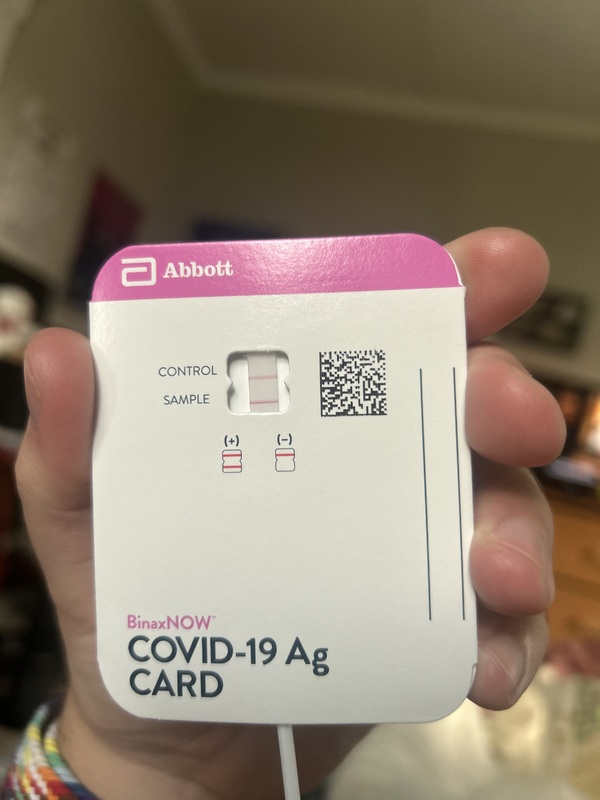 2023-06-20
2023-06-20Finally got COVID
I finally got sick with COVID after 3 years. I went on a cruise to celebrate my fiancé’s graduation and had to remove my mask when the heat was so bad in Mexico, Belize, and Honduras. I’m mostly worried about getting my fiancé sick who is disabled, but hopefully we don’t live together just yet. I’m currently being isolated in my parents house watching people stream on Twitch.TV and playing Animal Crossing. I had a fever of 101 yesterday, and hopefully am able to return to work on Friday which means I’ll be able to represent my work at Hampton Roads Pride on Saturday. Since it’s pride month, me getting COVID feels very homophobic -
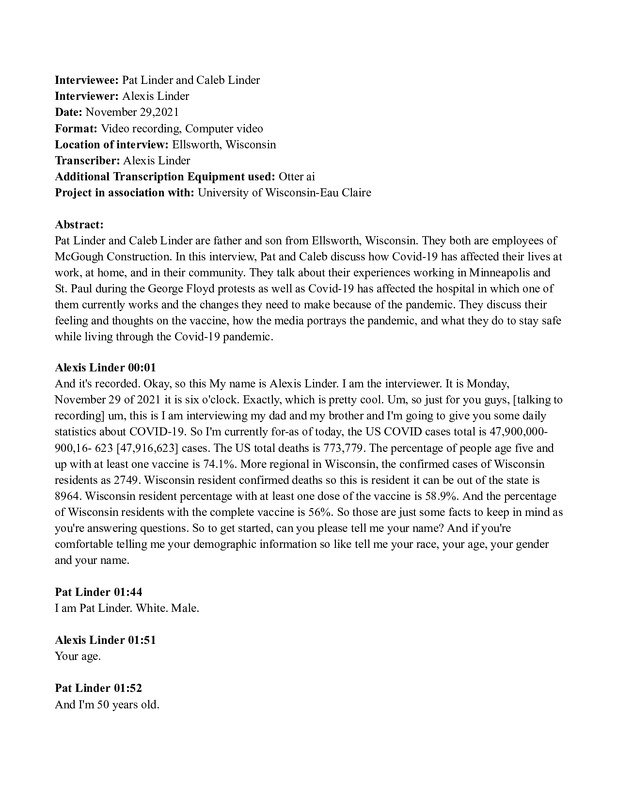 2021-11-29
2021-11-29Pat and Caleb Linder Oral History, 2021/11/29
Pat Linder and Caleb Linder are father and son from Ellsworth, Wisconsin. They both are employees of McGough Construction. In this interview, Pat and Caleb discuss how Covid-19 has affected their lives at work, at home, and in their community. They talk about their experiences working in Minneapolis and St. Paul during the George Floyd protests as well as Covid-19 has affected the hospital in which one of them currently works and the changes they need to make because of the pandemic. They discuss their feeling and thoughts on the vaccine, how the media portrays the pandemic, and what they do to stay safe while living through the Covid-19 pandemic. -
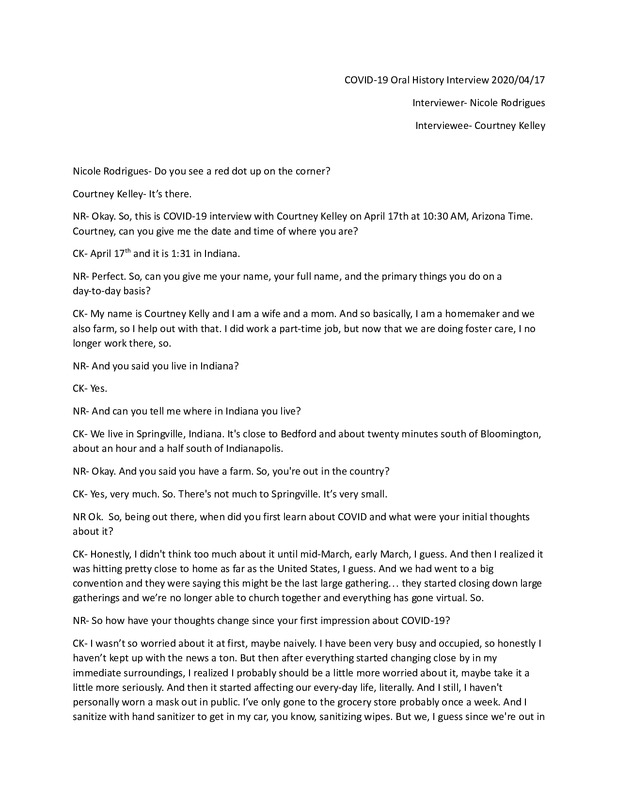 2020-04-17
2020-04-17Courtney Kelley Oral History, 2020/04/17
